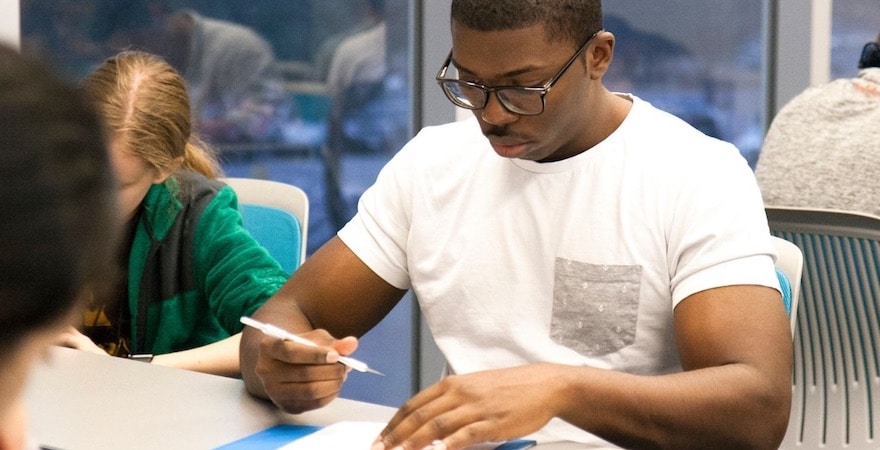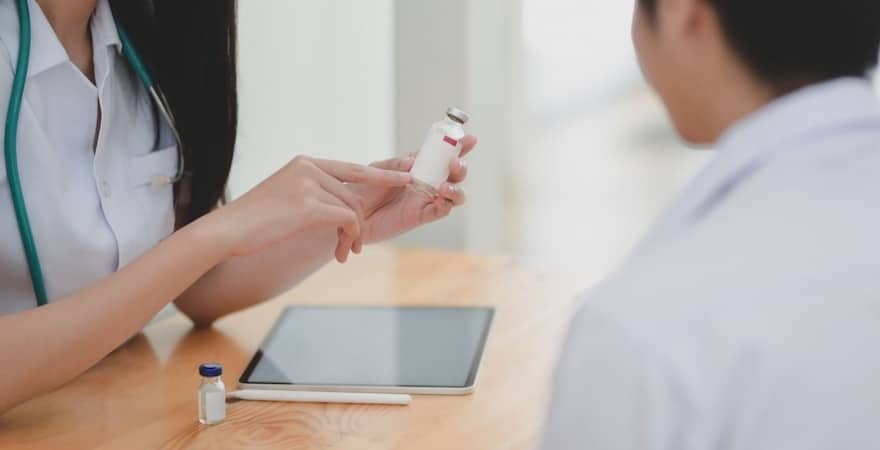What is the pharmacy school application process?
Applying to pharmacy school requires advance planning and preparation. Regardless of how brilliant you are or how badly you want to become a pharmacist, the only picture an admissions committee will have of you is the one you paint in your application materials. This is not an application that can be thrown together at the last minute. A careful image can be cultivated through years of planning.
To make matters even more complicated, the application content and deadlines are not universal. Each school has their own requirements, and you are required to navigate each without missing a step. This article will help you understand the process and timeline for applying to pharmacy school.
Fortunately, many pharmacy programs use a common application platform called PharmCAS, which streamlines the administrative aspects of submitting multiple applications. Common elements that most schools require include the following:
- biographical information
- academic transcripts
- Pharmacy College Admissions Test (PCAT) scores (80% of schools require this exam)
- work or volunteer experience
- application fees
In addition to these basic requirements, many schools also require additional materials, such as letters of recommendation and a personal essay. If you already have a shortlist of programs, you can check their requirements at the PharmCAS website or individual program website.
After you submit your application, PharmCAS will validate that the application is complete (allow 4 weeks). Then, it is up to each pharmacy program to review your package and notify you of next steps. For example, many programs require on-site interviews as part of their student selection process.
What is the timeline for applying to pharmacy school?
The truth is that there is no single, correct timeline for applying to pharmacy school.
The truth is that there is no single, correct timeline for applying to pharmacy school. Prerequisite requirements vary by the type of program and type of application. For example, the coursework and expectation for real-life work experiences will be greater for programs that require a Bachelor’s degree than for those that allow matriculation after completing only 2 to 3 years of undergraduate studies. In addition, the early fall deadlines for early decision applications require that you have the entire application package available, including PCAT, 1 or 2 semesters earlier than for a standard application.
Because the requirements for each application can vary widely, applicants are strongly advised to create a checklist and timeline for each task that must be completed. A sample checklist is available from the University of California Irvine. As your individual application experience is unique, you should create your own detailed checklist. Then, stick to it!
A sample timeline for a student planning to enter pharmacy school in the fall after graduating from college with a Bachelor’s degree is provided below. The steps can be adjusted accordingly if you plan to apply at a different time.
Sample timeline for applying to pharmacy school
Freshman Year of College
- Pre-matriculation planning: Meet with an academic advisor and map out a plan to complete prerequisite courses. Your college major does not have to be in a science, as long as you take the required prerequisite courses. Although specifics vary, most pharmacy programs require one to two semesters each of core science courses (with lab), including biology, chemistry, organic chemistry, microbiology, and biochemistry. One to two semesters of calculus, statistics, and English are also commonly required. A list by program is available at the American Association of Colleges of Pharmacy (AACP) website.
- Earn good grades: GPA is a criterion used by all pharmacy schools to evaluate the strength of an applicant. Some schools also use a GPA calculated based on only the prerequisite courses, so it is particularly important that you do your very best from day 1 of college.
Sophomore and Junior Years of College
- Continue earning good grades: If your grades were not perfect during your freshman year, you still have time to improve. GPA growth demonstrates commitment and improvement while you are taking even more challenge coursework, and pharmacy programs view that favorably.
- Prepare for the PCAT: Put extra effort into course material that will help you prepare for the PCAT. It can be helpful to learn what content is tested by the PCAT before you even take the course.
- Work Experience: Find work experience at a pharmacy or volunteer in the healthcare field to demonstrate your desire for this career path and gain some real-world insights that will benefit you in future pharmacy program interviews.
- Register for the PCAT: Registration becomes available each spring around April or May. The earlier your sign up, the more likely you are to secure a spot at your preferred testing location and date. The earliest testing date occurs in the summer, and this is the date you will want if you are applying for early decision programs (September deadline).
Senior Year of College
- Study for the PCAT: You should allow at least 2 to 3 months to prepare for the PCAT, possibly longer if you haven’t taken the prerequisites for a long time or you struggled with the material for any subject. Similar to the SATs and ACTs, there are many courses and materials offered to help you prepare.
- Take (or retake) the PCAT on the fall or early winter testing dates: In general, you do not want to plan to take the PCAT after December before the year you are applying.
- Ask for letters of recommendation: If they are required for any of your schools, you should allow work supervisors or college professors at least 3 months to write your letter of recommendation. Remember, they are asked to do this a lot and you want to ensure they have sufficient time to do a good job.
- Request official transcripts: Ask your school how long they need to prepare these so you don’t get caught off-guard.
- Prepare a personal statement
- Submit your PharmCAS application: Also be prepared to submit any supplemental application materials.
- Prepare for interviews: Ask current pharmacy students what to expect and practice answering questions out loud with a friend so you can get feedback on how your answers sound. This practice will also help you to avoid "umms" and "uhhs" during your interview.
Pharmacy Application Requirements by State
- AL Alabama
- AK Alaska
- AZ Arizona
- AR Arkansas
- CA California
- CO Colorado
- CT Connecticut
- DE Delaware
- FL Florida
- GA Georgia
- HI Hawaii
- ID Idaho
- IL Illinois
- IN Indiana
- IA Iowa
- KS Kansas
- KY Kentucky
- LA Louisiana
- ME Maine
- MD Maryland
- MA Massachusetts
- MI Michigan
- MN Minnesota
- MS Mississippi
- MO Missouri
- MT Montana
- NE Nebraska
- NV Nevada
- NH New Hampshire
- NJ New Jersey
- NM New Mexico
- NY New York
- NC North Carolina
- ND North Dakota
- OH Ohio
- OK Oklahoma
- OR Oregon
- PA Pennsylvania
- RI Rhode Island
- SC South Carolina
- SD South Dakota
- TN Tennessee
- TX Texas
- UT Utah
- VT Vermont
- VA Virginia
- WA Washington
- DC Washington, DC
- WV West Virginia
- WI Wisconsin
- WY Wyoming

What is the pharmacy school class cycle?
PharmD programs follow the traditional college cycle and start in the fall. Like undergraduate programs, the school year structure can follow either a semester, quarter, or trimester cycle.
The structure of the pharmacy program determines the length of time each student spends in pre-pharmacy and professional PharmD studies. Generally, students who graduate with a PharmD will spend 6 to 7 years of studies after completing high school. The amount of time spent in pre-pharmacy studies can vary from 2 to 4 years, which is followed by 3 to 4 years of professional pharmacy studies.
AACP maintains a table of pharmacy program structures and term cycles at their website.
Is there a deadline for applications?
Yes, but there is no single deadline that applies to all pharmacy schools. The deadlines vary substantially depending on the school and the type of application.
Yes, but there is no single deadline that applies to all pharmacy schools. The deadlines vary substantially depending on the school and the type of application. When making your checklist, keep in mind the earliest deadline for any school on your list.
The PharmCAS admissions cycle begins in mid-July. As soon as the application becomes available on the PharmCAS website you can submit materials as long as they are completed by the deadline your school has selected, which ranges from November to June. General advice is to submit your application as soon as possible to avoid the wave of applications that are pushed through PharmCAS in the days immediately preceding a deadline. PharmCAS recommends all materials are submitted at least 2 weeks in advance.
Two situations may require you to complete your application well in advance of the first PharmCAS deadline in November. If you plan to apply as an early decision applicant, you will need all materials submitted by September. Also, if you are applying to a school with rolling admissions, you will want to submit your material as soon as possible, because there is no guarantee what date all positions will be filled.
Are there any application fees?
PharmCAS charges a standard application fee of $175 for the first program application. Additional program applications are $55 each. Some schools charge a supplemental application fee in addition to the PharmCAS fee.




